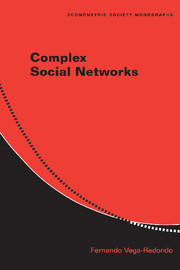Book contents
- Frontmatter
- Contents
- Preface
- 1 Introduction
- 2 Complex Networks: Basic Theory
- 3 Epidemic Diffusion
- 4 Neighborhood Effects in Diffusion and Play
- 5 Searching in Social Networks
- 6 Search, Diffusion, and Play in Coevolving Networks
- Afterword
- A Generating Functions
- B The Ising Model
- C Mean-Field Theory
- Bibliography
- Index
- Econometric Society Monographs
6 - Search, Diffusion, and Play in Coevolving Networks
Published online by Cambridge University Press: 05 January 2013
- Frontmatter
- Contents
- Preface
- 1 Introduction
- 2 Complex Networks: Basic Theory
- 3 Epidemic Diffusion
- 4 Neighborhood Effects in Diffusion and Play
- 5 Searching in Social Networks
- 6 Search, Diffusion, and Play in Coevolving Networks
- Afterword
- A Generating Functions
- B The Ising Model
- C Mean-Field Theory
- Bibliography
- Index
- Econometric Society Monographs
Summary
In this final chapter, we study the interplay of search, diffusion, and play in the formation and ongoing evolution of complex social networks. First, we illustrate how the issue of network formation is addressed by that part of the received economic literature that highlights its strategic dimension. As will be explained in Section 6.1, even though game-theoretic models are concerned with an undoubtedly important aspect of the phenomenon, they also display a significant drawback. Their standard methodology (i.e. the full-rationality paradigm) as well as many of their implicit assumptions (e.g. a largely stable environment) abstract from the inherent complexity that pervades the real world.
In contrast, the approach pursued in the bulk of this chapter adopts a polar standpoint. It stresses the complexity of social networks but, as a contrasting limitation, it largely eschews the strategic concerns that also play an important role in many cases. The analysis ranges from models where local search is the main driving force in network formation (Section 6.2) to those where the focus is on the interaction between network evolution and agents' embedded behavior (Section 6.3). Finally, a brief reconsideration of matters is conducted in Section 6.4, where it is also suggested that a genuine integration of strategic and complexity considerations should be one of the primary objectives of future network analysis.
GAME-THEORETIC MODELS OF NETWORK FORMATION
Here we shall not attempt to provide an extensive description of the large body of literature that studies network formation from a game-theoretic viewpoint.
- Type
- Chapter
- Information
- Complex Social Networks , pp. 195 - 255Publisher: Cambridge University PressPrint publication year: 2007



